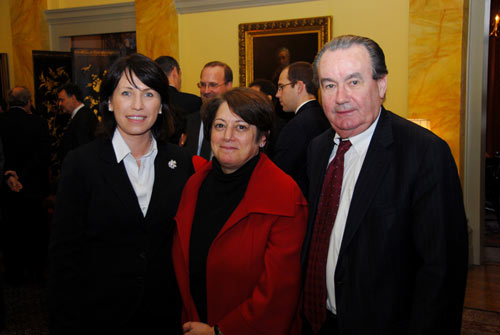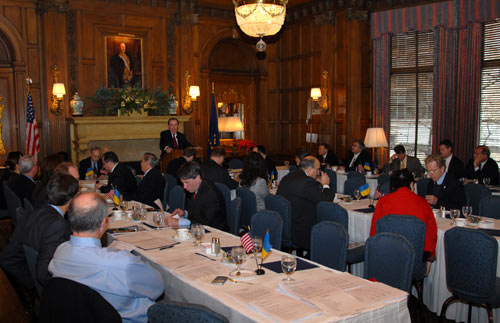
U.S.-UKRAINE BUSINESS COUNCIL WELCOMES ITS 100TH MEMBER, MICROSOFT
By Yaro Bihun, Special to The Ukrainian Weekly newspaper, No. 51, Page 1
Ukrainian National Association (UNA), Parsippany, NJ, Sun, Dec 21, 2008
WASHINGTON - The U.S.-Ukraine Business Council (USUBC), an association devoted to enhancing trade and investment relations between the two countries, has reached its goal of having 100 member-companies by the end of 2008. And that member is the world's leading developer and producer of computer operating systems and programs - the Microsoft Corp.
That announcement was made here on December 17 by Morgan Williams, at a luncheon during the USUBC's annual meeting in Washington. The meeting also re-elected Mr. Williams as the group's president and CEO.

The USUBC is the largest Ukrainian business related trade association outside of Ukraine. Since its founding in 1995 it has promoted the strengthening of U.S.-Ukraine bilateral cooperation in business, trade and investment.
Microsoft, the creator of the Windows computer operating system and Office program that now dominate the world’s personal computers, now joins with other U.S. corporations in that effort, among them such well-known companies as Boeing, Coca-Cola, General Dynamics, Halliburton, Kraft Foods, Lockheed Martin, Northrop Grumman, Pratt & Whitney – Paton, Proctor and Gamble and 3M, as well as many smaller less-recognizable companies and such non-commercial institutions as the Kennan Institute, Woodrow Wilson International Center for Scholars, the U.S.-Ukraine Foundation and the Ukrainian American Bar Association, among others.
Introducing Microsoft’s senior director of global trade policy and strategy, Dorothy Dwoskin, Mr. Williams noted that Microsoft is already active in
Ukraine, with more than 150 employees dealing primarily with intellectual property issues. Ms. Dwoskin, in her brief remarks, added that Microsoft is also trying to help Ukraine develop its local computer economy.
The luncheon, attended by representatives of USUBC member-organizations and diplomatic and other representatives of the two countries, also heard greetings addressed to the organization from high U.S. and Ukrainian officials, as well as analyses of the current world economic crisis and its ramifications in Ukraine by representatives of the International Monetary Fund and a Washington think-tank.

Ukraine’s ambassador to the United States, Dr. Oleh Shamshur, presenting greetings and expressions of gratitude to the USUBC from President Viktor
Yushchenko, expressed his own hope that “we will weather the current situation together and we’ll find the way out in the quickest and the safest possible way of the dire straits of the world economy.”
President Yushchenko’s former ally, Prime Minister Yulia Tymoshenko, in her message to the group thanked its members for promoting “the right business
practices” in Ukraine. “I ask you to lead by example and help us to move forward in Ukraine,” she said in her message, read by Ron Slim of TD International.
There were also greetings from the U.S. Ambassador to Ukraine, William B. Taylor, Secretary Carlos M. Gutierrez of the Department of Commerce and
Ukraine’s First Lady Kateryna Yushchenko, who thanked the American companies for their commitment to improving the lives of Ukrainian citizens
and called on them to continue to do so by supporting Ukrainian health, education, cultural and arts organizations. “This is particularly necessary now, as the less fortunate sections of our society particularly feel the brunt of the world and national financial crisis,” she noted.
The effect on Ukraine of the current world economic crisis – on a day when the exchange rate for a U.S. dollar surpassed 9 hrv in Ukraine – were addressed in more detail by two representatives of the International Monetary Fund – its alternative executive director, Yuriy Yakusha, and mission chief for Ukraine
and the European Department Division, Ceyla Pazarbasioglu – and Anders Aslund, senior fellow at the Peterson Institute for International Economics in
Washington.
Mr. Yakusha said that no other country in the world equalled the “staggering” drop Ukraine experienced in its Gross National Product in November. He noted, however, that the IMF responded to Ukraine’s request for assistance with “unprecedented speed,” and the $4.5 billion Ukraine received from the IMF gave it “some breathing space.”
Ms. Pazarbasioglu added, however, that the IMF cannot do it alone. There is a need for foreign investment and other measures if Ukraine is to come out of this crisis intact, she said. On the other hand, she said, this crisis can be an opportunity to reform. But it is a global phenomenon in which country-specific
solutions will not be sufficient, she said. “I think that the solutions have to be regional and global.”
What Ukraine is going through is “almost like a perfect storm,” she said. Steel prices are down, and steel accounts for about 40 percent of Ukraine’s
exports. “Going forward, what is desperately needed in Ukraine is a coherent set of measures, a vision of how this crisis will be overcome, and a good way to articulate it to the public,” she said. “Different statements by different parties do not help. It creates a lot of confusion.”
Like Ms. Pazarbasioglu, Mr. Aslund also saw a possible positive result from this crisis for Ukraine. Despite the “tremendous blow” of the 25 percent loss of its steel exports and the massive GDP drop in November, he said, this crisis could move Ukraine to get it right by developing other industries, moving more toward manufacturing and becoming more diversified, and by turning from the Russian market toward Europe. “This could turn Ukraine much more into a middle-class society and less an oligarchic society,” he stated.
LINK: The Ukrainian Weekly, Editor-in-chief: Roma Hadzewycz, staff@ukrweekly, www.ukrweekly.com, two photographs are shown.
